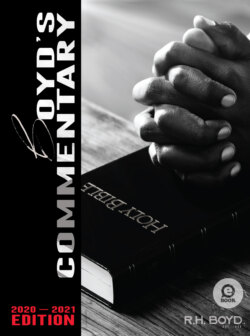Читать книгу Boyd's Commentary - R.H. Boyd Publishing Corporation - Страница 31
На сайте Литреса книга снята с продажи.
II. JOSEPH’S MERCY (GENESIS 42:18–25)
ОглавлениеFor his fear of God, Joseph had a change of heart. The phrase “I fear God” in verse 18 (NRSV) can be interpreted in a couple of ways. But it literally says, “God, I fear,” meaning Joseph had a moral code to which he adhered. One of the tenets of that code was not to oppress a weaker person. In the moment, the brothers were powerless and hungry. The tables had turned, and they were now the weaker ones. The brothers clearly had not lived by this same code. It was through their actions that this family drama crescendoed in such a sensational fashion. So instead of holding all of his brothers hostage in prison, Joseph decided to hold only one and let the rest return home on the condition that they still come back to Egypt with Benjamin, their youngest brother. Joseph’s new plan was practical in that it ensured more grain could be carried for the family and that he would have an opportunity to see Benjamin, his only full brother.
His scheme also served to put them in a position reminiscent of the one in which they put him. Perhaps this might inspire reflection about what they had done and thought they had gotten away with. After accepting Joseph’s proposal, his brothers said to one another, “We are guilty,” interpreting their ordeal as God’s judgment against them. With deep conviction they believed the distress that had come upon them was the direct result of what they did to Joseph. Reuben was especially outspoken in this regard, believing himself to be more vindicated than the others for the act. He reinforced the shared guilt by reminding his brothers that for what they had done his blood was now required of them.
Unbeknownst to the brothers who were speaking to each other in Hebrew, Joseph understood everything they were saying. He only spoke Egyptian and used an interpreter with them. But overhearing them speak in his native tongue about their remorse, Joseph became emotional and turned away to weep. His emotional turmoil became increasingly evident, despite the façade of his stern demeanor and harsh words. After gathering himself, he returned with greater resolve and took Simeon and bound him before their eyes. K. A. Matthews observes: “Joseph’s gracious action of returning the brothers’ sacks each filled with grain and further provisions for the journey was ambiguous. It can be interpreted in two opposing ways: one, he did it to trump up evidence to sustain the charge that they were dishonest men, or two, he did it for the benefit of his father and family. This ambiguity reflects the internalized tension and conflict Joseph is having to contend with in general. Outwardly he is a hardened interrogator, but inwardly he is a broken-hearted brother whose emotions he hasn’t fully processed and yet must restrain himself” (Matthews, New American Commentary: Genesis 11–50, 781).
Beyond his emotions, Joseph had to determine who these men before him were. Most certainly they were his brothers, but they had thrown him into a pit and sold him into slavery. Were they the cold-hearted men of yesteryear or had they changed? Had they learned about brotherhood? Joseph also may have been deciding whether or not he wanted to be a brother. He had done well without them. He did not need them, but did he want them?
